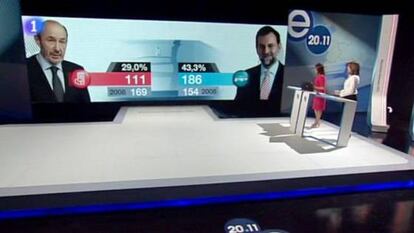Bosses at national broadcaster TVE creating “parallel newsroom”
Workers warn that new hirings have coincided with transfer of reporters to obscure shows


The decision by Spanish state broadcaster TVE to hire 11 journalists via a fast-track procedure for its television newscasts has sparked a wave of protests among staff reporters, who call it the latest attempt to make TVE conform to the government’s views.
TVE workers and unions are already talking about “a parallel newsroom,” a model that was successfully introduced some time ago at the regional public broadcaster Telemadrid. The president of RTVE, José Antonio Sánchez, used to work at Telemadrid before his current appointment. The regional channel has often come in for criticism due to its perceived bias in favor of the regional Popular Party government, which owns the station.
Company officials at TVE said the new hirings were justified because of the “dense electoral year” up ahead, which includes local, regional and national elections, including early elections in Andalusia and Catalonia. Covering all of these events will require “a significant effort from the national desk, which will need reinforcement from other sections, which will in turn create dysfunctions in an already tight newsroom.”
The new management team has had a chance to create a newsroom in its own image”
TVE reporter
But a spokesperson for the UGT labor union said that this is all about “replacing the voices of our own professionals with government mouthpieces.”
Of the 11 new employees, several came from Intereconomía, a small private network known for its right-wing ideology. Meanwhile, TVE employees noted that several regular newscast workers have been transferred to obscure programs such as Agrosfera, which covers agricultural issues, or to En lengua de signos, a news program broadcast in sign language.
“This way, the new [management] team has had a chance to create a newsroom in its own image,” said one seasoned reporter at TVE.
This is not the first time that TVE has faced accusations of bias. Prior to the 2004 elections, the network was widely perceived to serve as a mouthpiece of the party in power. The Socialist government of Prime Minister José Luis Rodríguez Zapatero, however, took measures to increase TVE’s independence, looking to the BBC for inspiration. However, since the Popular Party returned to power in 2011, both industry insiders and viewers have complained of a return to the network’s past.
For example, in August 2012, the anchor of the morning show Los desayunos de TVE, Ana Pastor, claimed that she was being laid off by the network due to a politically motivated decision. Pastor specialized in interviewing politicians, and had a highly publicized on-air confrontation with the secretary general of the ruling Popular Party (PP), María Dolores de Cospedal.
Public regional broadcasters in Spain have also been struggling in recent years due to dwindling budgets and falling audiences, who often view these stations as controlled by the party in government. In late 2013, the Valencian station Canal Nou completely shut down.
Tu suscripción se está usando en otro dispositivo
¿Quieres añadir otro usuario a tu suscripción?
Si continúas leyendo en este dispositivo, no se podrá leer en el otro.
FlechaTu suscripción se está usando en otro dispositivo y solo puedes acceder a EL PAÍS desde un dispositivo a la vez.
Si quieres compartir tu cuenta, cambia tu suscripción a la modalidad Premium, así podrás añadir otro usuario. Cada uno accederá con su propia cuenta de email, lo que os permitirá personalizar vuestra experiencia en EL PAÍS.
¿Tienes una suscripción de empresa? Accede aquí para contratar más cuentas.
En el caso de no saber quién está usando tu cuenta, te recomendamos cambiar tu contraseña aquí.
Si decides continuar compartiendo tu cuenta, este mensaje se mostrará en tu dispositivo y en el de la otra persona que está usando tu cuenta de forma indefinida, afectando a tu experiencia de lectura. Puedes consultar aquí los términos y condiciones de la suscripción digital.








































